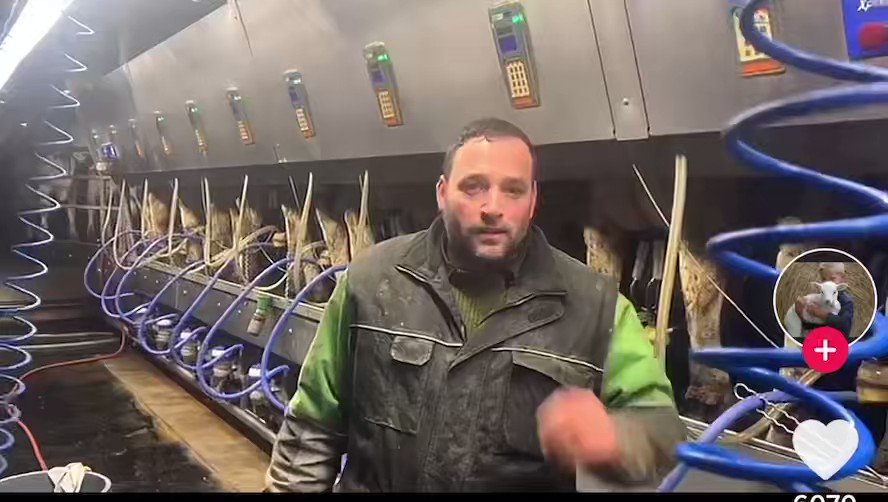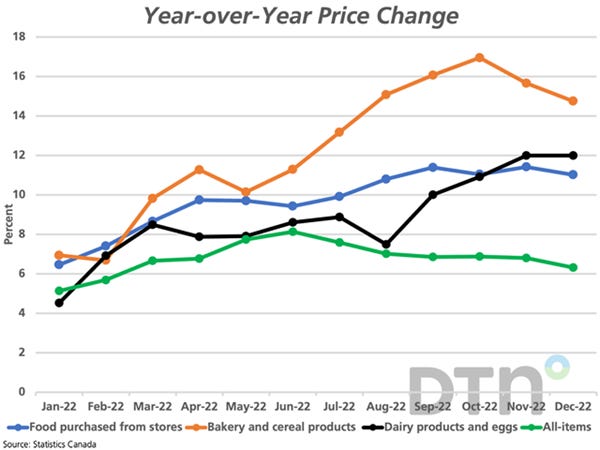'It Breaks My Heart': Canadian Farmer Forced to Dump 30,000 Liters of Milk as Dairy Prices Surge
This might seem like economic madness—and it is. So why does it persist?
Canadian dairy farmer is speaking out after being forced to dump thousands of liters of milk after exceeding the government’s production quota.
In a video shared on TikTok by Travis Huigen, Ontario dairy farmer Jerry Huigen says he’s heartbroken to dump 30,000 liters of milk amid surging dairy prices.
“Right now we are over our quotum, um, it’s regulated by the government and by the DFO (Dairy Farmers of Ontario),” says Huigen, as he stands beside a machine spewing fresh milk into a drain. “Look at this milk running away. Cause it’s the end of the month. I dump thirty thousand liters of milk, and it breaks my heart.”
Huigen says people ask him why milk prices are so high.
“This here Canadian milk is seven dollars a liter. When I go for my haircut people say, ‘Wow, seven dollars Jerry, for a little bit of milk,” he says, as he fills a glass of the milk being dumped and drinks. “I say well, you have to go higher up. Cause we have no say anymore, as a dairy farmer on our own farm. They make us dump it.”

The (Old) Folly of Destroying Food
Before you chalk the milk dumping up to those crazy Canadians, it should be pointed out that milk dumping is also quite common in the United States (though for different reasons).
During the early stages of the pandemic, FEE wrote about farmers dumping millions of gallons of milk even as prices for dairy products were increasing. Nor was this some kind of pandemic quirk. It’s been going on for years.
"More than 43 million gallons’ worth of milk were dumped in fields, manure lagoons or animal feed, or have been lost on truck routes or discarded at plants in the first eight months of [the year], according to data from the U.S. Department of Agriculture," the Wall Street Journal reported in 2016.
The reasons are different in Canada than the United States, but they both stem from the highly-regulated nature of the marketplace.
In the United States, the primary regulations are high-level price-fixing, bans on selling unpasteurized milk (which means farmers have to dump their product if dairy processors don’t buy it), and “price gouging” laws that prevent retailers from increasing prices when demand is low, which incentivizes hoarding.
In Canada, the regulations are even worse.
While the price-fixing scheme for milk in the US is incredibly complicated and leaves much to be desired—there's an old industry adage that says “only five people in the world know how milk is priced in the US and four of them are dead”—in Canada the price is determined by a single bureaucracy: the Canadian Dairy Commission.
The Ottawa-based commission (technically a “Government of Canada Crown Corporation”), which oversees Canada’s entire dairy system (known as Supply Management), raised prices three times in 2022, citing “the rising cost of production.”
Food price inflation remains a serious issue in Canada, but the problem is particularly acute in regards to dairy products, which has seen their annual inflation rate triple over the past year, to almost 12 percent.
One needn’t have a PhD in economics to see why prices in Canada are surging. Ordering farmers to destroy tens of thousands of liters of perfectly good milk is hardly a solution to rising prices. The same goes for production quotas.
Canada’s milk dumping spectacle calls to mind FDR’s New Deal debacles, including the “1933 Emergency Hog Slaughter,” which saw American farmers ordered to destroy their own pigs in an attempt to raise the price of hogs.
Under the Agricultural Adjustment Act (AAA), the federal government levied new taxes on the agricultural sector and used the funds to oversee the wholesale destruction of cattle and crops.
“Federal agents oversaw the ugly spectacle of perfectly good fields of cotton, wheat, and corn being plowed under. Healthy cattle, sheep, and pigs by the millions were slaughtered and buried in mass graves,” explained FEE President Emeritus Lawrence Reed.
This destruction took place, mind you, during the worst food crisis in American history.
‘This Time I’m Going Public’
This might seem like economic madness—and it is. So why does it persist?
One reason is old-fashioned protectionism. High tariffs protect producers from competition, and the quotas that cap production also are designed to keep out new dairy producers. This keeps prices high, which is supposed to make farmers happy; it also pleases the government, which makes revenue from the tariffs.
It’s lousy for consumers, of course, and as Huigen’s milk dumping episode shows, even the farmers who benefit by the protection have grown angry with quotas that prevent them from producing more milk (which would have the dual benefit of earning farmers more profit and lowering milk prices for consumers).
Another reason is that very few people—Canadians or Americans— realize the milk dumping is happening and the production quotas exist. It’s a very opaque process, but Jerry Huigen is trying to change that.
“This time I’m going public,” Huigen says in his video. “I want the people to see the pain that us growers have…our little bit of profit goes down the drain.”
Hopefully people take notice and begin to realize that functioning markets are the real solution to rising prices, not government production quotas and price-fixing.
That would ease not just Jerry Huigen’s pain, but the pain of consumers as well.




